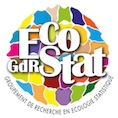PROGRAMME
LES EXPOSES SERONT PREFERENTIELLEMENT EN FRANCAIS (EN ANGLAIS POUR LES PRESENTATEURS NON-FRANCOPHONES)
JEUDI 10h-12h30 - MINI-FORMATIONS (OPTIONNEL)
- 10h15-11h15 "9 quick tips for ecologists discovering machine learning" (en français), par Vincent MIELE (CNRS)
- 11h30-12h30 "Introduction aux visual transformers", par Alexis Joly (INRIA/Pl@ntNet)
JEUDI 14h-15h50 - SESSION 1 - Chairs: Stéphane Dray & Olivier Dézerald
Exposés pléniers
- 14h00 : Jalal Fadili (CNRS) : Le centre AISSAI du CNRS - AI for Sciences, Sciences for AI
- 14h15 : Jean-Olivier Irisson (Sorbonne Université) : Apprentissage machine pour les images de plancton et de neige marine (distanciel)
Exposés des participant.es
- 14h50 : Puissant Agathe : Quantification et diversification des motifs de couleurs chez les Papilionidae
- 15h00 : Parisey Nicolas: De l'utilité des efforts coordonnés pour la vision par ordinateur en écologie ?
- 15h10 : Baletaud Florian : Automatic detection, identification and counting of deep-water snappers on underwater baited video using deep learning
- 15h20 : Panaiotis Thelma : Content-aware segmentation of objects spanning a large size range: application to plankton images (distanciel)
- 15h30 : Baity-Jesi Marco : Ensembles of Data-Efficient Image Transformers: a New Paradigm for Automated Classification in Ecology (distanciel)
- 15h40 Chamaillé-Jammes Simon : DeepFaune: un outil de reconnaissance automatique des espèces dans les images et vidéos de piéges photographiques (distanciel)
JEUDI 15h50: PAUSE 20 min
JEUDI 16h10-17h30 - SESSION 2 - Chair : Julien Renoult
Exposés des participant.es
- 16h10 : Roy Amédée : Using deep generative networks to simulate seabirds foraging trajectories
- 16h20 : Gay Paul : «Ibaï Begi» Vidéo comptage pour les passes à poissons
- 16h30 : Denimal Emmanuel : Comptage de tetras lyre (Lyrurus tetrix) avec YOLOV3
- 16h40 : Pautrel Léa : Modéliser la biodiversité en temps continu : exploiter les données de capteurs pour mieux connaître la faune
- 16h50 : Didier Donsez : Inexpensive Edge sensor for recognizing and counting the presence of humans (anonymous) and animals into wild and protected areas. (distanciel)
Exposé plénier
- 17:00 - Tanya Berger-Wolf (Ohio State University) : "Imageomics: Images as the Source of Information about Life" (distanciel)
Introducing the new field of imageomics: from images to biological traits using biology-structured machine learning.
Images are the most abundant, readily available source for documenting life on the planet. Coming from natural history collections, laboratory scans, field studies, camera traps, wildlife surveys, autonomous vehicles on the land, water, and in the air, as well as tourists’ cameras, citizen scientists’ platforms, and posts on social media, there are millions of images of living organisms. But their power is yet to be harnessed for science and conservation. Even the traits of organisms cannot be readily extracted from images. The analysis of traits, the integrated products of genes and environment, is critical for biologists to predict effects of environmental change or genetic manipulation and to understand the significance of patterns in the four billion year evolutionary history of life.
I will show how data science and machine learning can turn massive collections of images into high resolution information database about wildlife, enabling scientific inquiry, conservation, and policy decisions. I will share our vision of the new scientific field of imageomics.
JEUDI 18h- ... Apéritif dinatoire au Toï-Toï Le Zinc (Villeurbanne) [début du service dinatoire à 19h]
VENDREDI 9h30-10h30 - SESSION 3 - Chairs: Vincent Miele & Sakina-Dorothée Ayata
Exposés des participant.es
- 09h30 : Michaud Félix : Data-centric AI for Ecoacoustics
- 09h40 : Crochard Ludovic : Ecouter les abeilles : quantifier l'activité acoustique des pollinisateurs dans les champs de tournesols grâce au deep learning
- 09h50 : Salis Ambre : Harceler un prédateur nécessite de crier dans le bon ordre: Machine learning & Syntaxe chez les mésanges
- 10h00 : Lehnhoff Loïc : Apports et perspectives de l'IA à l'analyse sonore : application pour la détection et l'identification de vocalisations de cétacés (distanciel)
- 10h10 : Cretois Benjamin : La détection automatisée de la parole dans les données éco-acoustiques permet la protection de la vie privée et la quantification des perturbations humaines (distanciel)
- 10h20 : Funosas Planas David : Assessing the potential of BirdNET for automated processing of ecoacoustic data: a case study in South-West France (distanciel)
- 10h30: Frédéric Sebe: Use of AI to access acoustic connectivity in corridors
10h40: PAUSE 20 minutes
VENDREDI 11h20-13h00 - SESSION 4 - Chairs : Olivier Gimenez + François Martignac
Exposés des participant.es
- 11h20 : Dibot Nicolas : Modelling animal beauty from the sparsity of neuronal activations in a deep neural network
- 11h30 : Silva Nicolas : Sex recognition in a visually monomorphic dull bird species
Exposé plénier
- 11h40 : Alexis Arnaud (GriCad) "problématique de la diffusion des données, en particulier des images, dans le cadre de la science ouverte"
12h10-13h00 : TABLE RONDE °1 "Quel cadre pour la diffusion des données/images ?". Co-animateurs : Guglielmo Fernandez Garcia, Nicolas Parisey (INRAe)
13h00 : DEJEUNER
VENDREDI 14h00-14h50 - SESSION 5 - Chairs : Guglielmo Fernandez-Garcia & François Martignac
Exposé plénier
- 14:00 - Yseult Hejja-Brichard (University of Maryland) (Visio confirmé) "IA methods to study sexual selection"
Exposés des participant.es
- 14h30 : Testud Guillaume : AutomatIsation de la Gestion des coLlisions aviairEs ( Projet AIGLE)
- 14h40 : Moulherat Sylvain : OCAPI - Plateforme d'annotation des données issues de capteurs
- 14h50 : Tieo Sonia : Modélisation de la beauté des visages et impact de la beauté sur le comportement socio-sexuel des Mandrills
VENDREDI 15h00-16h00: TABLE RONDE °2 "Quels sont nos outils d'annotation favoris ?" Co-animateur : Olivier Gimenez (CEFE)
VENDREDI 16h00-16h10: Discussion générale et mots de la fin


